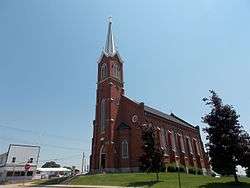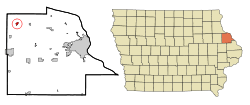Luxemburg, Iowa
Luxemburg is a city in Dubuque County, Iowa, United States. It is part of the Dubuque, Iowa Metropolitan Statistical Area. The population was 240 at the 2010 census, down from 246 in 2000. The White Pine Hollow State Forest is located four miles to the northwest of Luxemburg.
Luxemburg, Iowa | |
|---|---|
 Holy Trinity Catholic Church | |
 Location of Luxemburg, Iowa | |
| Coordinates: 42°36′17″N 91°4′36″W | |
| Country | |
| State | |
| County | Dubuque |
| Area | |
| • Total | 0.47 sq mi (1.22 km2) |
| • Land | 0.47 sq mi (1.22 km2) |
| • Water | 0.00 sq mi (0.00 km2) |
| Elevation | 1,175 ft (358 m) |
| Population | |
| • Total | 240 |
| • Estimate (2019)[3] | 247 |
| • Density | 523.31/sq mi (201.84/km2) |
| Time zone | UTC-6 (Central (CST)) |
| • Summer (DST) | UTC-5 (CDT) |
| ZIP code | 52056 |
| Area code(s) | 563 |
| FIPS code | 19-47460 |
| GNIS feature ID | 0458690 |
Geography
Luxemburg is located at 42°36′17″N 91°4′36″W (42.604830, -91.076542).[4]
According to the United States Census Bureau, the city has a total area of 0.46 square miles (1.19 km2), all land.[5]
Demographics
| Year | Pop. | ±% |
|---|---|---|
| 1920 | 93 | — |
| 1930 | 105 | +12.9% |
| 1940 | 124 | +18.1% |
| 1950 | 120 | −3.2% |
| 1960 | 159 | +32.5% |
| 1970 | 185 | +16.4% |
| 1980 | 271 | +46.5% |
| 1990 | 257 | −5.2% |
| 2000 | 246 | −4.3% |
| 2010 | 240 | −2.4% |
| 2019 | 247 | +2.9% |
| Source:"U.S. Census website". United States Census Bureau. Retrieved 2020-03-28. and Iowa Data Center Source: | ||
2010 census
As of the census[2] of 2010, there were 240 people, 100 households, and 74 families living in the city. The population density was 521.7 inhabitants per square mile (201.4/km2). There were 103 housing units at an average density of 223.9 per square mile (86.4/km2). The racial makeup of the city was 100.0% White. Hispanic or Latino of any race were 1.7% of the population.
There were 100 households, of which 28.0% had children under the age of 18 living with them, 68.0% were married couples living together, 2.0% had a female householder with no husband present, 4.0% had a male householder with no wife present, and 26.0% were non-families. 25.0% of all households were made up of individuals, and 13% had someone living alone who was 65 years of age or older. The average household size was 2.40 and the average family size was 2.86.
The median age in the city was 44 years. 23.3% of residents were under the age of 18; 4.3% were between the ages of 18 and 24; 23% were from 25 to 44; 28% were from 45 to 64; and 21.7% were 65 years of age or older. The gender makeup of the city was 51.3% male and 48.8% female.
2000 census
As of the census[7] of 2000, there were 246 people, 92 households, and 72 families living in the city. The population density was 540.2 people per square mile (206.5/km2). There were 94 housing units at an average density of 206.4 per square mile (78.9/km2). The racial makeup of the city was 100.00% White.
There were 92 households, out of which 31.5% had children under the age of 18 living with them, 70.7% were married couples living together, 4.3% had a female householder with no husband present, and 21.7% were non-families. 20.7% of all households were made up of individuals, and 12.0% had someone living alone who was 65 years of age or older. The average household size was 2.67 and the average family size was 3.10.
In the city, the population was spread out, with 27.6% under the age of 18, 6.1% from 18 to 24, 27.2% from 25 to 44, 18.7% from 45 to 64, and 20.3% who were 65 years of age or older. The median age was 39 years. For every 100 females, there were 100.0 males. For every 100 females age 18 and over, there were 100.0 males.
The median income for a household in the city was $35,833, and the median income for a family was $46,667. Males had a median income of $26,042 versus $19,643 for females. The per capita income for the city was $15,314. None of the population or families were below the poverty line.
Education
Residents are within the Western Dubuque Community School District.[8] Zoned schools include Farley Elementary School in Farley,[9] Drexler Middle School in Farley, and Western Dubuque High School in Epworth.[10]
References
- "2019 U.S. Gazetteer Files". United States Census Bureau. Retrieved July 17, 2020.
- "U.S. Census website". United States Census Bureau. Retrieved 2012-05-11.
- "Population and Housing Unit Estimates". United States Census Bureau. May 24, 2020. Retrieved May 27, 2020.
- "US Gazetteer files: 2010, 2000, and 1990". United States Census Bureau. 2011-02-12. Retrieved 2011-04-23.
- "US Gazetteer files 2010". United States Census Bureau. Archived from the original on 2012-07-02. Retrieved 2012-05-11.
- "Census of Population and Housing". Census.gov. Retrieved June 4, 2015.
- "U.S. Census website". United States Census Bureau. Retrieved 2008-01-31.
- "Western Dubuque." Iowa Department of Education. Retrieved on July 24, 2018.
- "2017 Elementary Boundaries." Western Dubuque Community School District. Retrieved on July 24, 2018. Detail on Luxemburg and New Vienna
- "WDHS Boundary map." Western Dubuque Community School District. Retrieved on July 24, 2018.